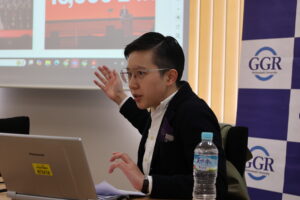On December 13, 2024, the Hitotsubashi University Institute for Global Governance Research (GGR) held a Talk Session entitled “Campaign Policy vs. Policy Implementation: The Case of the Thai Digital Wallet Scheme” with Parin Jaruthavee, a researcher at King Prajadhipok’s Institute, Thailand, as a guest speaker.
Ms. Jaruthavee described the Digital Wallet Scheme, a flagship economic initiative in Thailand’s recent political landscape, aimed at stimulating economic activity through targeted financial transfers to eligible citizens. Introduced on March 13, 2023, as part of the Pheu Thai Party’s campaign, the scheme promised universal financial aid for Thai citizens aged 16 and above. Under the Srettha Thavisin Administration (August 2023 – August 2024), it faced criticism for deviating from campaign pledges, particularly in funding clarity and implementation.
In September 2023, policy studies were assigned to the Deputy Finance Minister, and by November, a summary confirmed the scheme’s continuation with adjustments. Initially planned as a 560 billion THB initiative funded without loans, it was revised to 500 billion THB through a Loan Act. The Paetongtarn Shinawatra Administration, beginning August 15, 2024, pledged to uphold the scheme with coalition-driven modifications.
Phase I began in September 2024, providing 10,000 THB to vulnerable groups, while Phase II aimed to extend benefits to citizens aged 50 and above. Despite its potential, the scheme faced scrutiny due to delays, changing eligibility criteria, and sustainability concerns—underscoring the gap between campaign promises and implementation. Srettha’s revised plan cut funding by 60 billion THB and altered recipients. His cabinet later approved 122 billion THB under the 2024 Additional National Budget Act, prioritizing vulnerable groups. Challenges included sustainability, legal constraints, inflation, and implementation risks.
In conclusion, Ms. Jaruthavee noted significant discrepancies between promises and execution. Although the initiative aimed at economic revitalization, public trust eroded due to delays, funding changes, and controversy.
During the question-and-answer session, several questions were raised. Among them: “Why do political parties reveal only a small portion of information when they make a budget proposal?” and “Does this policy actually boost the economy, or does it create more inflation?” In response to the first question, the speaker replied this is due to the subcommittees and the political strategy to avoid controversy with opponents. For the second question, she believes it is not actually boosting the economy.
【Event report prepared by】
Billal Hossain (Doctoral student, Graduate School of Law, Hitotsubashi University)

